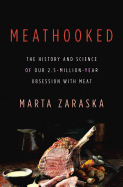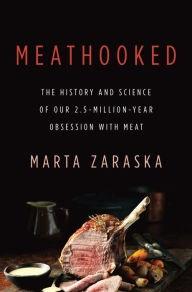
 Polish-Canadian science journalist Marta Zaraska prefaces her history of humans eating meat by mentioning scientific studies of its harmful effects on health, the environment and (of course) animals, but Meathooked is more a fascinating story of our growing global consumption of meat than a political diatribe. Zaraska notes the statistical increase in a carnivore's risks of contracting colorectal cancer, diabetes and cardiovascular disease. She references popular studies showing that "each burger contributes as much to global warming as driving an average American car for 320 miles." She repeats animal rights observations about over-crowded cages and feedlots, non-anesthetized chicken beak and pig tail amputations, and slaughterhouse stress. Yet we keep consuming more and more meat--and not just in the United States. The projected fastest-growing demand for meat is in Asia, where it will increase by 56% over 10 years. What makes humans devour so many ribs and chops--what has us hooked on meat?
Polish-Canadian science journalist Marta Zaraska prefaces her history of humans eating meat by mentioning scientific studies of its harmful effects on health, the environment and (of course) animals, but Meathooked is more a fascinating story of our growing global consumption of meat than a political diatribe. Zaraska notes the statistical increase in a carnivore's risks of contracting colorectal cancer, diabetes and cardiovascular disease. She references popular studies showing that "each burger contributes as much to global warming as driving an average American car for 320 miles." She repeats animal rights observations about over-crowded cages and feedlots, non-anesthetized chicken beak and pig tail amputations, and slaughterhouse stress. Yet we keep consuming more and more meat--and not just in the United States. The projected fastest-growing demand for meat is in Asia, where it will increase by 56% over 10 years. What makes humans devour so many ribs and chops--what has us hooked on meat?
Zaraska's story begins a few billion years ago, when bacteria first shed their rigid cell walls and took to eating one another. Quickly she steps along a historical timeline that includes the still-existent carnivore worm, prehistoric cephalopods and arthropods, and, finally, our African hominin ancestors, standing on two legs and drifting from a diet of plant fiber, seeds and nuts to their first taste of meat. Some might argue that it's been downhill from there, but Zaraska spends several chapters explaining the human biochemical need for protein, iron and vitamin B12, which meat readily provides. She takes us through the importance of genetics, taste, texture and scent to the evolution of meat eating. After all this science, Zaraska suggests that humans can certainly survive without meat--perhaps even survive longer--but there is something more than science to our craving for bacon and a succulent rack of lamb. A vegetarian, she admits to her own occasional slip, like a cheesesteak at Pat's King of Steaks in Philadelphia, where she reports, "It's good, very good. I can truly see (or rather taste) what all the fuss is about."
If nutrition and science are not the primary drivers of meat eating, social, cultural and economic factors may be the culprits. Zaraska explores the impact of the meat industry's subsidies, the developing world's desire to emulate the behavior of the wealthier West, the advertising juggernaut selling both the sizzle and the steak, and the off-putting historical arrogance of vegetarian movements. She touches on efforts to mimic meat's taste in foods like soy burgers, to make insects more palatable (such as Cricket energy bars in the U.S.), and to create in vitro meat--although the latter at "$330,000 per five ounces is a bit pricey." In the end, a more vegetarian diet might be best for humans and for Earth, but as Zaraska concludes: "The meat hooks are far too strong for that." --Bruce Jacobs, founding partner, Watermark Books & Cafe, Wichita, Kan.
Shelf Talker: With science, history, anecdote and wit, science writer Marta Zaraska explores the causes and effects of the growing global appetite for meat.

